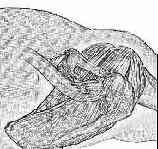- Discussion:
- recurrent rotator cuff tear:
- ref: Mode of failure for rotator cuff repair with suture anchors identified at revision surgery
- deltoid injury:
- may occur from axillary nerve palsy or from avulsion of deltoid off the acromion;
- consider EMG to determine whether the injury is an neuropraxia or neurotmesis;
- detached deltoid:
- detached anterior deltoid may be diagnosed by careful palpation on physical exam;
- look for a defect at the origin of the deltoid from the acromion and a prominence of the deltoid distal to the defect that is accentuated by active elevation of the arm;
- MRI should help confirm the diagnosis;
- superior migration of the humeral head:
- is more apt to occur w/ massive rotator cuff tears;
- may occur due to excision of CA ligament and excessive acromioplasty;
- missed diagnosis
- nerve palsy:
- w/ failed rotator cuff surgery, consider obtaining an MRI of the shoulder, to evaluate for space occupying lesion causing suprascapular nerve palsy;
- also consider EMG
- occult instability (anterior or multi-directional)
- biceps tendonitis
- AC joint arthrosis
- os acromiale
- ref: Os acromiale: anatomy and surgical implications.
- recurrent impingement
- cervical spondylosis
- reflex sympathetic dystrophy
- thoracic outlet syndrome
- glenohumeral osteoarthritis
- Management Suggestions:
- revision acromioplasty in worker's compensation patients is unlikely to improve symptoms;
- if a specific diagnosis can be made (either recurrent impingement or other), then a second operation may be indicated;
Failed Repair of the Rotator Cuff. Evaluation and Treatment of Complications.
Superior Humeral Dislocation: A Complication Following Decompression and Debridement for Rotator Cuff Tears.
Operative Treatment of failed repairs of the rotator cuff.


